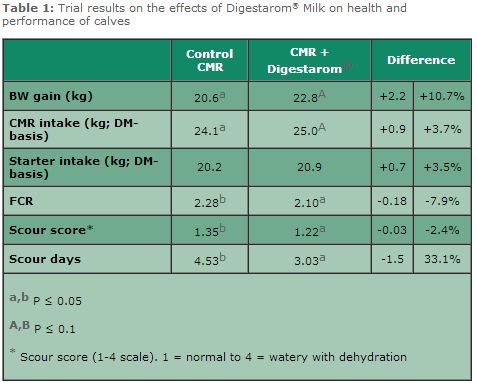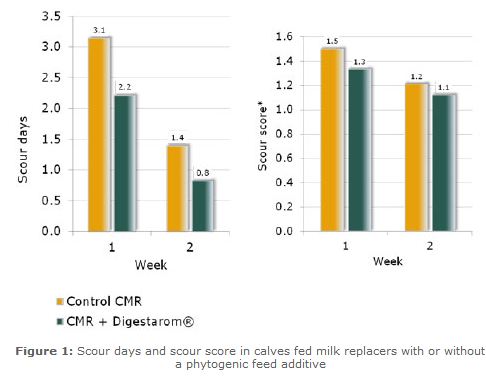



Effect of Phytogenic Supplementation on Calf Performance Fed in a Commercial Milk Replacer
Many farmers are aware of the importance of efficient heifer rearing, but a phytogenic supplementation could assist calf development through feed efficiency and improved intake, says Biomin.The cost of rearing heifers is second only to the feed cost of the milking herd. Therefore, it makes sense to focus on managing the growth of heifers so they are properly developed and be capable of entering the milking herd at 24 months of age. Reducing the age at first calving by 3, 2, or even 1 month can have a significant impact on the profitability of the dairy. Managing to reach this goal begins within the first hours of the heifer’s life and continues at every step along the challenging way.
The objectives of this paper are to discuss some of the early challenges calves experience and to present the results of trials evaluating a phytogenic (essential oil/botanical) product in a commercial milk replacer on the performance of preweaned calves.
Pre-weaning management
Calves face many of challenges before weaning that can reduce their productivity and, in turn have a big negative impact on the farm profitability. The pre-weaning death loss for heifers born alive is 8-10 per cent , and unfortunately, this is considered normal and acceptable on many farms. However, progressive dairymen who are better managers achieve losses of 3 per cent or less.
The 2006 NAHMS data indicate that over 75 per cent of preweaned heifer mortality was due to scours, diarrhea or other digestive problems (56.5 per cent ) and respiratory problems (22.5 per cent ). These statistics, which are found in similar frequencies in other countries, make it clear that maintaining a healthy gut environment should receive high priority to keep calves healthy and growing according to plan.
Although respiratory maladies are not directly linked to a healthy gut environment, it is intuitive that a healthier and stronger calf should be much less susceptible to disease and be able to ward off other health altering challenges.
The future productivity of heifers starts by delivering a sufficient quantity of clean, high quality colostrum in the first hours of life and repeated within the next 10 to 12 hours post partum.
Milk for feeding, like colostrum, be it a reconstituted milk replacer or waste milk on large dairies, must be of sufficient quantity and quality. The point being that waste milk should be properly pasteurized and milk replacers are handled in a manner that does not introduce pathogens into the mixing vessel or the delivery system before being fed to the calves.
Calf health management is both art and science. Calf care givers must understand calves, recognize behavioral changes and be responsive to changes in the calf’s apparent health condition. At the same time they must have the tools needed to either minimize or respond to health challenge.
In the past only antibiotics were seen as the most viable approach to reducing digestive upsets and maintaining performance. Today, however, many producers are looking to phytogenics (essential oils and botanical products) to maintain calf performance as viable alternatives to antibiotics.
Phytogenic products are not really new and have a long history in human health, but are they are being “rediscovered” as natural alternatives for use in maintaining animal health and performance. Not only are these product effective, they have the added benefit of favorably viewed and accepted by today’s consumers.
The role of phytogenics
Phytogenic feed additives are a group of plant-derived substances that have been known for thousands of years. Their main actions are:
Positively impact palatability: this is especially useful with a) ad libitum feeding (calves reared in a “natural way” will drink 8, 10 or more liters of milk/day and achieve a much higher growth rate than calves fed a limited amount of milk; b) calves that are off-feed for whatever reason will eat consume more and return to normal intake sooner when the appetite is stimulated by phytogenic additives.
Increased digestibility: a combination of different factors, such as increased saliva production, enzyme secretion and optimization of intestinal microbiota are primary and lead to a reduction in toxic microbial metabolites, relief from immune stress, and reduction in subclinical intestinal inflammation processes. These effects lead to better calf health through a higher nutrient availability and reduced pathogenic bacteria pressure.
The anti-inflammatory effect can be explained through the down-regulation of the transcription factor NF-kB (involved in the pro-inflammatory response) and the activation of the transcription factor Nrf-2, responsible for anti-oxidative activity (University of Gießen, Germany).
Supplementation of calf milk replacers with Phytogenics
A trial was held in the Land O’Lakes Research Facility (Wisconsin U.S.A.) to investigate the effects the phytogenic additive Digestarom® Milk (BIOMIN GmbH, Herzogenburg, Austria) on the performance and health of calves when added to a Calf Milk Replacer (CMR) (courtesy of B. L. Miller, T. J. Earleywine and T.E. Johnson, Land O’Lakes Inc.). Digestarom® Milk is a blend of plant extracts (herb, spices, essential oils and non-volatile plant extracts) formulated to increase palatability, digestion and improving zootechnical parameters which help maintain a better intestinal health and a reduction in digestive disturbances, i.e. scours.
In total 107 Holstein bull calves (3-10 d old) with an average initial weight of 47.3 kg were randomly assigned according to body weight and blood gamma globulin levels to either a control or experimental milk replacer CMR diet offered in a 15 per cent solids solution.
Both diets utilized a 22 per cent all milk protein/20 per cent fat non-medicated CMR powder. The experimental diet was the same as the control with the phytogenic feed additive (inclusion level: 0.05 per cent ). Calves were fed to provide 681 g DM feeding rate daily in 2 feedings. Calf starter (18 per cent crude protein, as fed basis) was fed ad libitum throughout this 42 d trial.
Calves offered no phytogenic additive were inferior (P = 0.10) in total weight gain, CMR intake (P = 0.07), feed efficiency (P < 0.05), scour scores (P < 0.01) and scour days (P < 0.01) when compared with calves receiving Digestarom®. Thus, the phytogenic additive improved calf performance and health status.
As general conclusion to be driven from the trial phytogenics (Digestarom® Milk) show an ability to improve feed intake and feed efficiency and reduce scour days and scour scores, indicating improved health status. These results encourage further research to be carried on this topic.





